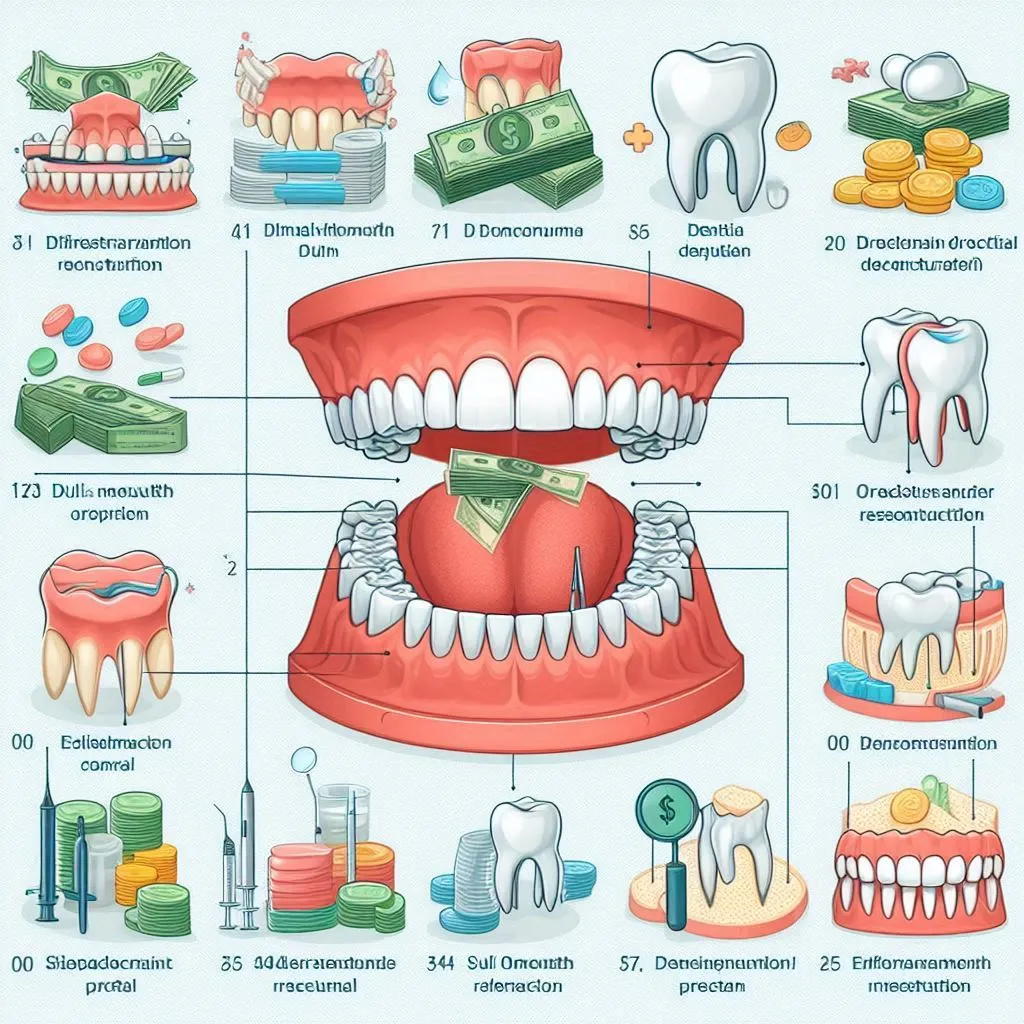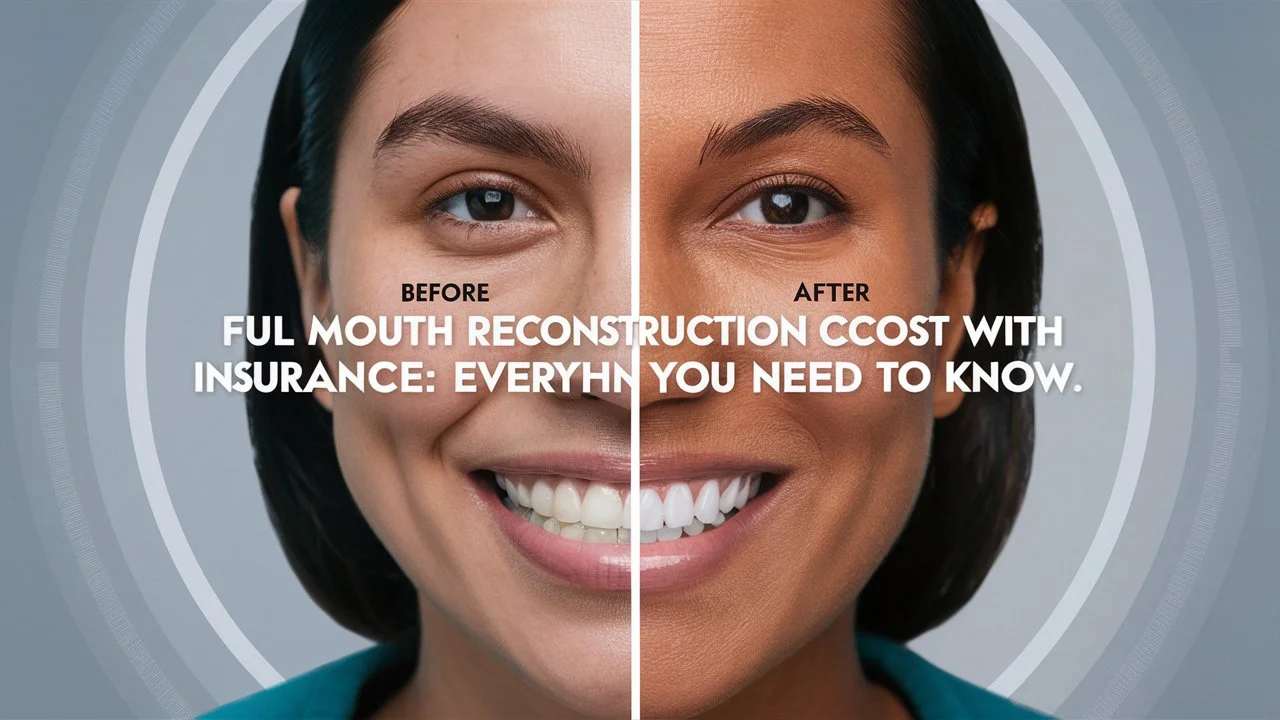Are you concerned about how to pay for a full-mouth reconstructive procedure? Because of the cost, a healthier, more self-assured smile should not be beyond reach. Learn all about the details of full mouth reconstruction, including how much it costs and how dental insurance can lower out-of-pocket expenses.
Full mouth reconstruction cost with insurance varies widely but can significantly reduce out-of-pocket expenses.
Among the many dental operations that make up a complete mouth reconstruction are:
- Dental implants
- Crowns and bridges
- Gum surgery
- Tooth extractions
People with serious dental problems, like gum disease, severe tooth decay, or traumatic injuries, typically need this intensive surgery. Gaining a better grasp of your insurance coverage and investigating financing options will help make this investment in oral health more doable, even though the expense is initially intimidating.
When would I need full mouth reconstruction?

It may be necessary to have a full mouth reconstruction due to certain oral problems and situations:
If fillings or root canals cannot address the disease, full mouth reconstruction may be necessary to restore the function and appearance of teeth impacted by extensive decay.
Loss of bone density, tooth movement, and eventual tooth loss are all symptoms of advanced gum disease, also known as periodontitis. A full mouth reconstruction can fix these problems by repairing damaged gum tissue, placing new teeth on implants or bridges, and realigning the bite.
Full jaw reconstruction may be necessary after traumatic injuries, which include accidents or injuries that damage numerous teeth significantly (e.g., fractures, dislocations, or tooth loss).
Damage from acid reflux, years of teeth grinding (bruxism), or other causes of enamel erosion can necessitate whole mouth restoration with crowns, bridges, or other restorative operations.
Full mouth reconstruction may be necessary to address tooth formation and alignment concerns caused by congenital malformations or developmental anomalies. These diseases can impact certain people’s quality of life.
Failures or complications from prior dental work: When restorations break, the bite is misaligned, or problems arise with dentures or implants, a complete mouth reconstruction may be necessary to fix the problem.
After a comprehensive assessment that considers the severity of the dental problems, the patient’s general health, and the desired aesthetic and functional results, a dentist may recommend full-mouth reconstruction as a course of treatment.
The Range of Restorative Treatments and Techniques

A comprehensive procedure known as full mouth reconstruction aims to restore the entire mouth’s health, function, and beauty. Multiple dental operations, each with its own distinct function, are incorporated to improve oral health.
Dental implants
Dental implants are a typical part of a whole-mouth restoration. Surgically implanted into the jawbone, these titanium prosthetic roots replace lost teeth. Dental implants can improve the look of your mouth and restore your chewing and speaking abilities by providing a sturdy base for dentures, bridges, or crowns.
Crowns and Bridges
Crowns and bridges are standard components when reconstructing an entire mouth. A tooth-shaped cap called a crown can strengthen and improve the look of a tooth that has been injured or is decaying by covering its whole visible portion.
Gums Surgery
Gum surgery might be the only option after extensive bone and tissue loss due to gum disease. Remodelling or rebuilding the gum tissue and underlying bone can create a healthier base for the new dental restorations.
Tooth Extractions
Tooth extractions may be necessary when severe cavities, infections, or overcrowding occur. These troublesome teeth are extracted during a full mouth reconstruction to place implants, bridges, or other restorative therapies.
Your dental requirements and the severity of your problems will determine the precise surgeries needed for complete mouth restoration. After carefully assessing your condition, your dentist will craft an individual treatment strategy.
Full mouth reconstruction is an extensive process, not a one-and-done operation, and it might take months—if not years—to complete. Every step is vital if you want your new, completely repaired smile to last a lifetime.
How Much Does Full Mouth Reconstruction Cost?

Several factors affect the cost of a full mouth restoration. Tens of thousands of dollars are common for those without dental insurance. With the right insurance coverage, out-of-pocket payments can be made easier.
The typical out-of-pocket expenses, uninsured:
- Dental implants: $3,000 – $6,000 per implant
- Crowns: $800–$1,800 per crown
- Bridges: $2,000–$5,000 per bridge
- Gum surgery: $1,000 – $3,000 per quadrant
- Tooth extractions: $200–$600 per tooth
The overall cost can rise rapidly if more than one surgery is needed. For example, if you don’t have health insurance, a full mouth restoration that includes several implants, crowns, bridges, and gum surgery may quickly go over $50,000.
Full mouth reconstruction surgeries can be expensive, but most dental insurance policies cover at least part of the cost. Nevertheless, the scope of coverage will depend on your individual plan and the procedures involved.
To fully grasp dental insurance, one must be familiar with the following:
- In-network vs. out-of-network providers: Most plans offer higher coverage levels when you visit an in-network dentist, so choosing a provider within your plan’s network can save you money.
- Deductibles, copays, and coinsurance: Many plans require a deductible before coverage kicks in, and you may also have to pay a percentage of the cost (coinsurance) or a fixed copay for specific procedures.
- Annual and lifetime maximums: Most dental plans have an annual maximum benefit amount, typically from $1,000 to $2,000. Some plans also have a lifetime maximum, which can be a concern for expensive procedures like full mouth reconstruction.
Reviewing your plan’s details carefully and consulting with your insurance provider is crucial to getting a more accurate estimate of your out-of-pocket costs with insurance. They can provide specific information on the coverage levels for each procedure involved in your full mouth reconstruction.
Read More: e & o insurance for notary
Maximizing Your Dental Benefits: Getting the Most from Your Dental Insurance

You need to know precisely what your plan covers to get the most out of your dental insurance, which can help pay for a complete mouth reconstruction. If you don’t, you can spend more money than planned or miss out on savings.
Reviewing Plan Documents Thoroughly
Examining the dental plan’s paperwork, particularly the coverage and benefits summary, should be your first order of business.
Find out your entire mouth reconstruction procedure-specific deductible, copayment, coinsurance rates, and annual or lifetime maximums. Please do not hesitate to contact your insurance provider if you require any clarification on your coverage or have any queries.
Negotiating Costs with Dental Providers
After you understand your plan’s advantages, you may investigate how to achieve the best results. One viable option is to pay out of pocket. Another viable option is to negotiate fees with dental practitioners. For major procedures like full mouth reconstruction, many dentists are ready to lower their prices by working with patients who pay in advance or have dental insurance.
Exploring Alternative Financing Options
Another strategy to maximize your perks is to look into various forms of funding. To help patients budget for their dental care, several practices provide in-house payment plans that can be spread out over months or even years at a low or no interest rate. Compared to more conventional financing options, dental loans and credit card repayment conditions for medical bills are often more accommodating.
Strategic Treatment Planning for Annual Maximums
You must carefully schedule dental care if your insurance policy has a yearly maximum benefit limit. Collaborate with your dentist to determine which operations are most important, and if you have any leftover coverage, you can use it to pay for more treatments next year. If you follow this strategy, you can maximize your insurance coverage without worrying about reaching your annual maximum soon.
Utilizing Tax-Advantaged Accounts
Don’t forget to explore tax-advantaged accounts like Flexible Spending Accounts (FSAs) or Health Savings Accounts (HSAs) if you can access them. These accounts allow you to set aside pre-tax dollars for qualified medical expenses, including dental treatments, which can provide additional savings on your total mouth reconstruction costs.
Taking Time to Maximize Benefits
To make the expense of a complete mouth reconstruction more affordable, it is important to familiarize yourself with your dental insurance coverage and investigate all of your options.
FINANCIAL PLANNING FOR FULL MOUTH RECONSTRUCTION PROCEDURES
You must carefully schedule dental care if your insurance policy has a yearly maximum benefit limit. Collaborate with your dentist to determine which operations are most important, and if you have any leftover coverage, you can use it to pay for more treatments next year. If you follow this strategy, you can maximize your insurance coverage without worrying about reaching your annual maximum soon.
Obtaining a Detailed Treatment Plan and Cost Estimate
If eligible, consider opening a tax-advantaged account, such as a Health Savings Account (HSA) or a Flexible Spending Account (FSA). These accounts allow you to put away pre-tax cash for dental treatments and other qualified medical expenses, which can help you save even more on entire mouth reconstruction.
To make the expense of a complete mouth reconstruction more affordable, it is essential to familiarize yourself with your dental insurance coverage and investigate all of your options.
Assessing Your Financial Situation
If you don’t have the money to pay for it all at once, look into payment plans. Make more reasonable monthly payments with the help of one of the many flexible payment plans offered by dental offices. You can also use a healthcare credit card or apply for a low-interest dental loan to cover the treatment costs.
Exploring Payment Plan Options
Think about ways to pay for it over time if the whole amount is more than you can afford right now. Make more reasonable monthly payments with the help of one of the many flexible payment plans offered by dental offices. You can also use a healthcare credit card or apply for a low-interest dental loan to cover the costs of the procedure.
Accounting for Indirect Costs
As you make your treatment budget, consider possible indirect expenses like transportation, lodging (if travelling), and time off work for rehabilitation. You should include these extra costs because they can add up.
Utilizing Tax-Advantaged Accounts.
Consider opening a particular savings account or using tax-advantaged accounts like FSAs or HSAs to put money away for some expenses. By putting pre-tax cash into these accounts, you can save even more on your dental bills.
Maintaining Open Communication with Your Dentist
Keep an open line of communication with your dentist during the planning process to discuss any issues or worries you may have about keeping costs in check. To make complete mouth reconstruction more accessible, they can propose alternate treatment alternatives or help with financing strategies.
Creating a Comprehensive Financial Plan
If you take the time to make a detailed financial plan and stick to it, you may tackle your full mouth reconstruction with confidence, knowing that you’ll be able to handle the expenses.
Tips For Choosing A Dental Provider
Choosing a dentist you trust is essential when getting a complete mouth restoration. Not only does it affect the standard of treatment you get, but it also has the potential to significantly affect the total cost and your capacity to make the most of your insurance coverage.
Importance of In-Network Providers
The dentist’s office’s participation in your insurance plan’s network is crucial. Out-of-pocket charges for services provided by providers in your insurance company’s network are usually cheaper than those of those who are not. Dentists not part of an insurance plan’s network may charge more out-of-pocket costs or have higher deductibles and coinsurance.
Researching Credentials and Experience
Research a dental professional’s credentials, expertise, and reputation before committing to them. In your search for a dentist, be sure to find one that focuses on full mouth reconstructions and has vast experience with a wide range of operations, including gum surgery, dental implants, crowns, and bridges. For a list of local dentists who accept your insurance, you can look them up online, get referrals from people you know, or contact your insurance company.
Considering Office Accessibility and Environment
Think about the facility’s accessibility, operating hours, and previous patients’ experiences when deciding on a provider. When undergoing a lengthy procedure like a full mouth reconstruction, choosing a dental office that provides reasonable appointment times and a pleasant, inviting atmosphere is essential.
Scheduling Consultations
Once you have reduced your selections, schedule consultations with the dentists to discuss your requirements and treatment strategy. Ask about their approach to full-mouth reconstructions, success rates with different treatments, and experience with patients like yours during these sessions.
Discussing Costs and Insurance
Feel free to ask the dentist about their experience with various insurance types and the projected costs. An honest service provider will be up-front about their prices and will give you an accurate estimate that factors in your insurance, any discounts you may be eligible for, and any payment options they may have.
Building Trust and Open Communication
Building trust and an atmosphere of open communication with your dentist of choice is equally crucial. As you go through therapy, don’t hesitate to ask questions, voice concerns, and review your expectations. The success of a complete mouth reconstruction procedure depends on the dentist’s ability to listen to your concerns, answer your questions, and put your needs first.
Taking Time in the Selection Process
Research and select a dental practitioner who satisfies your requirements, stays within your budget and instills confidence and security. This is a substantial investment in your oral health and general wellness.
How To Prepare For Full Mouth Reconstruction
When you decide on a dentist and treatment plan, it is time to prepare for full mouth reconstruction. Thorough preparation can lead to a successful surgery and a speedy recovery.
Pre-Treatment consultations
Your dentist will schedule one or more pre-treatment consultations before the treatment begins. During these visits, they will examine your teeth and gums in detail, take any required X-rays or impressions, and review your treatment options. This is a great chance to ask any more questions or express your concerns to ensure you understand the procedure.
In addition to discussing what to eat and avoid while preparing for surgery, your dentist may give you specific pre-operative instructions. Attention to these directions to prevent problems and get the best result possible.
Planning for Recovery
Depending on the procedure’s scope, your dentist may advise you to take time off work or arrange for someone to help you while you recuperate from an entire mouth reconstruction. If you get dental implants or have major gum surgery, you may need to take it easy for a few days after surgery. Plan and prepare for childcare or help around the house to ensure a pleasant and stress-free recovery.
Mental and Emotional Preparation
Be mentally and emotionally ready for the procedure as well. Completing a full mouth reconstruction might take time, energy, and money. Your dentist is there to help, so don’t hesitate to talk to them about your worries. Another thing you might want to do is ask friends or family for help. They can offer support and encouragement as you get better.
Pain Management
Your dentist may prescribe or suggest over-the-counter pain medicines to alleviate any post-operative pain or discomfort. Be sure to follow their instructions in the letter, and don’t wait to contact them if you see anything unusual.
Dietary Adjustments
At the very least, you may need to alter your diet temporarily while fixing it. Your dentist may advise you to eat soft foods or drink liquids to ensure you have enough to eat and drink while you recuperate from some treatments, such as dental implant surgery or significant dental work. Ensure that you bring the right foods and drinks with you.
Conclusion
A full-mouth restoration is important for your teeth and well-being. Learn about your dental insurance and financing choices to make this life-changing treatment more affordable.
This extensive guide examines full mouth reconstruction costs and insurance coverage. We’ve covered how to maximize your insurance, which dentists are in-network, and what procedures are involved.
A full mouth reconstruction can be expensive, so budget and plan beforehand. Dental loans, payment plans, and tax-advantaged accounts can make the surgery more affordable.
Both mental and physical preparation for treatment are crucial. Pre-treatment consultations, work time off, and post-operative care instructions improve results.
Never forget that your dentist is always there for you. Ask questions, voice concerns, and get help as needed. Your complete mouth restoration success depends on your dentist’s skill, training, and commitment to your happiness.
A total mouth reconstruction can improve your quality of life and dental health by restoring your ability to eat, speak, and smile confidently. With the correct education, preparation, and encouragement, this life-changing operation can give you a healthier, more attractive smile for life.
Frequently Asked Questions
1. How much does a full mouth reconstruction cost in the US?
The cost of full mouth reconstruction in the US can vary widely, depending on the complexity of the case, the materials used, and the dentist’s expertise. On average, it ranges from $30,000 to $100,000 or more. This is because full mouth reconstruction often involves multiple procedures like implants, crowns, veneers, and sometimes orthodontics, all of which can add up.
2. Who is a good candidate for full mouth reconstruction?
A good candidate for full mouth reconstruction includes individuals who have:
- Multiple missing teeth
- Severely worn down or damaged teeth due to decay, trauma, or bruxism (teeth grinding)
- Chronic jaw pain or bite problems
- Extensive dental issues that affect both function and aesthetics People with these conditions can benefit from a tailored treatment plan to restore their oral health, bite function, and overall appearance.
3. What is the cost of a full mouth?
The term “cost of a full mouth” typically refers to full mouth reconstruction, which, as mentioned earlier, can cost between $30,000 and $100,000. The price depends on the extent of the work required, such as whether you’re getting dental implants, crowns, bridges, or veneers, and the number of procedures involved.
4. How long does full mouth reconstruction last?
Full mouth reconstruction can last for many years, typically 10-15 years or more, depending on the materials used and how well the patient maintains their oral hygiene. High-quality materials like ceramic or porcelain crowns and implants tend to last longer. Regular dental visits, proper oral care, and avoiding habits like teeth grinding or smoking can help prolong the lifespan of the reconstruction.

Justin Taylor is the creative force behind Insuranted.com, a premier destination for insightful and trustworthy insurance information. With a dedication to demystifying insurance complexities, Justin strives to equip readers with the knowledge they need to make smart, informed decisions.










